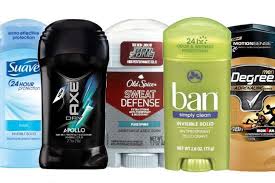|
|
 |
|
314.420.5099 [Question Line] [back to Health Topics main page] /
[back to "A" main page] A B C D E F G H I J K L M N O P Q R S T U V W X Y Z
WHAT IS THE DIFFERENCE BETWEEN ANTIPERSPIRANTS AND DEODORANTS?
Antiperspirants combat perspiration (sweat) and deodorants combat odor. Deodorants are substances that are most frequently applied to the armpits to reduce the 'body odor' caused by the bacterial breakdown of 'perspiration.' The subgroup of deodorants are called "antiperspirants" because they prevent odor and reduce sweat produced by certain parts of the body. Antiperspirants are most typically applied to the underarms, while deodorants can also be used on feet, the genitalia and other areas by using body sprays.
Deodorants are classified and regulated as over-the-counter (OTC) cosmetics by the U.S. Food and Drug Administration (FDA). They work to inhibit the growth of bacteria which cause odors. Deodorants are usually alcohol-based, which kills bacteria effectively. Deodorants can be formulated with other, more persistent antimicrobials such as triclosan, or with metal chelant compounds that slow bacterial growth. Deodorants also often contain perfume fragrances intended to mask the odor of perspiration. Deodorants may be combined with antiperspirants that are classified as drugs by the FDA. They attempt to stop or significantly reduce perspiration and therefore reduce the moist climate in which bacteria thrive. Aluminum chloride, aluminum chlorohydrate, and aluminum-zirconium compounds, most notably Aluminum zirconium tetrachlorohydrex gly, are the most widely used antiperspirants. Aluminum-based complexes react with the electrolytes in the sweat to form a gel plug in the duct of the sweat gland. The plugs prevent the gland from excreting liquid and are removed over time by the natural sloughing of the skin. The blockage of a large number of sweat glands reduces the amount of sweat produced in the underarms, though this may vary from person to person.
DO ANTIPERSPIRANTS AND DEODORANTS CAUSE BREAST CANCER? There have been e-mail rumors surfaced on the internet in the early 1990s that antiperspirants have a link in causing breast cancer; these are now widely considered to be an urban myth. According to the National Cancer Institute (NCI) and the American Cancer Society (ACS), these rumors are largely unsubstantiated by scientific research. Keep in mind that lymph nodes do help to clear toxins, they are not connected to the sweat glands. Further, sweat is not a significant route for eliminating toxins from the body.
/
[back to "A" main page]
[go to Supplements main page]
DISCLAIMER: **This web site's goal is to provide you with information that may be useful in attaining optimal health. Nothing in it is meant as a prescription or as medical advice. You should check with your physician before implementing any changes in your exercise or lifestyle habits, especially if you have physical problems or are taking medications of any kind. |

















 Human sweat really has no odor until it is fermented by bacteria that thrive in hot, humid environments such as the human underarm. The armpits are among the consistently warmest areas on the surface of the human body, and sweat glands provide moisture. Underarm hair adds to the odor by providing increased surface area on which this bacteria thrive. eeeeeek! You can control body odor by reducing moisture, killing bacteria or of course, covering up the bacteria's smell with perfume.
Human sweat really has no odor until it is fermented by bacteria that thrive in hot, humid environments such as the human underarm. The armpits are among the consistently warmest areas on the surface of the human body, and sweat glands provide moisture. Underarm hair adds to the odor by providing increased surface area on which this bacteria thrive. eeeeeek! You can control body odor by reducing moisture, killing bacteria or of course, covering up the bacteria's smell with perfume.